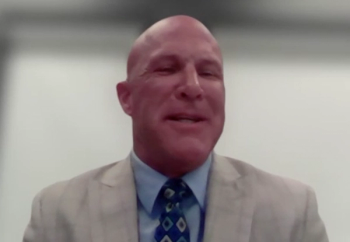
A solid majority said they would feel uncomfortable if doctors were relying on artificial intelligence for a diagnosis. Some see the potential for greater health equity.

A solid majority said they would feel uncomfortable if doctors were relying on artificial intelligence for a diagnosis. Some see the potential for greater health equity.

Kevin Olson is the chief information officer of Jupiter Medical Center, one of south Florida's top hospitals. He talks about digital transformation, cybersecurity and helping patients.

Within two years, it is expected that more than 70 million U.S. patients will benefit from remote patient monitoring. Yet some misunderstandings persist.

In other news, SelectHealth names a new chief executive, Jefferson hires a chief financial officer, and others take new leadership roles.

Mohamed Kamara created InovCares, a virtual care company to connect women with doctors who can aid them through pregnancy and afterwards.

More Americans are opting for the home instead of nursing homes or other long-term care facilities. Lissy Hu of WellSky talks about the need to ensure patients get what they need.

The online retailer says annual subscriptions to the primary care organization will cost $144, or $12 per month. Regulators won’t sue to block the deal but say their investigation continues.

In the second part of a conversation with Chief Healthcare Executive, Allen talks about closing gaps in healthcare in cities and some very remote areas.

The eastern Pennsylvania system says the attack hasn’t disrupted operations. The system says the attack comes from BlackCat, a gang with ties to Russia that authorities say is more sophisticated than some rivals.

Electronic payment technology can increase productivity and speed collections for providers, while giving consumers the electronic options they crave.

We talked about the company’s work with hospitals, the work towards interoperability, and why he’d like to see a nationwide patient ID.

We need a level of care between preventative medicine and catastrophic case management: preemptive care.

Health Gorilla’s Steven Lane talks about the growing support for sharing information, the obstacles ahead, and why interoperability can lead to greater health equity.

The number of breaches dipped in the second half of the year, but the number of people affected rose sharply, according to a new report.

The company’s virtual care platform offers mental health services and medical care at more than 250 colleges. CEO Luke Hejl said TimelyMD is poised for more growth.

CVS, Walgreen’s, Amazon and Walmart have all purchased primary care organizations. Hal Andrews of Trilliant Health talks about the changing landscape and what it means for health systems.

The health system must rethink its strategy to enable primary care providers to develop better game plans for chronic disease patients, such as people living with type 2 diabetes.

Regal Medical Group, based in southern California, said the breach occurred in December 2022.

Four lawmakers have sent letters to three companies expressing their concerns and asking what they are doing to ensure private information isn’t given to advertisers.

The founder and CEO of Lumeon, he spoke with us about using automation to reduce the burden on staff and improve patient care.

A Republican leading a key panel has introduced a bill to kill the troubled project. Oracle says the pulling the plug would hurt veterans, and the company says it’s making progress in resolving issues.

Tallahassee Memorial Healthcare continues to deal with the security issue that began late last week. Providers are using handwritten notes.

The measure would allow employers to offer standalone telehealth benefits, similar to vision and dental plans.

Providers and health plans are managing more administrative tasks electronically, but there is still room for more progress, according to the new CAQH Index. Spending on business functions rose $18 billion in 2022.

A pro-Russian hacktivist group claimed credit. Federal authorities had issued an alert about the group this week.